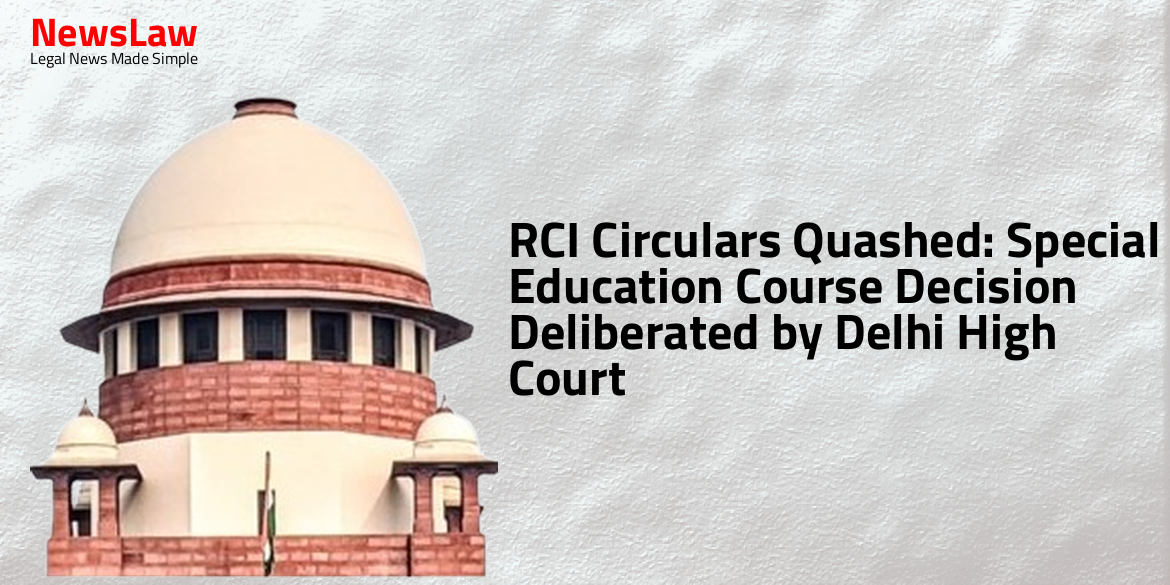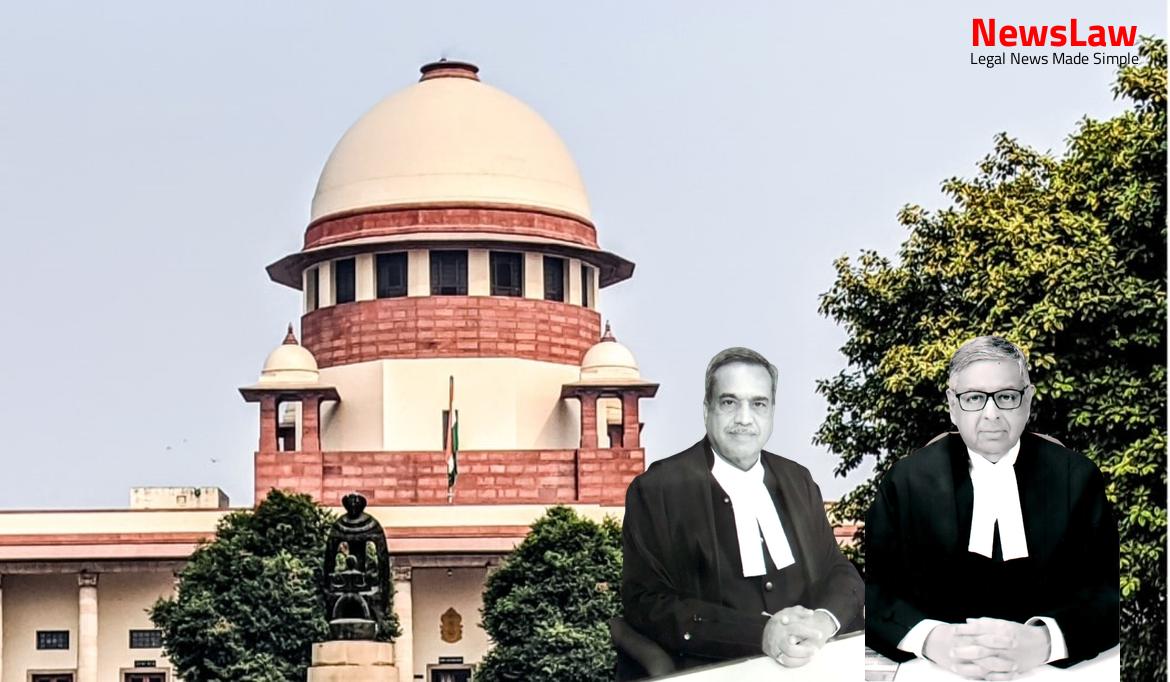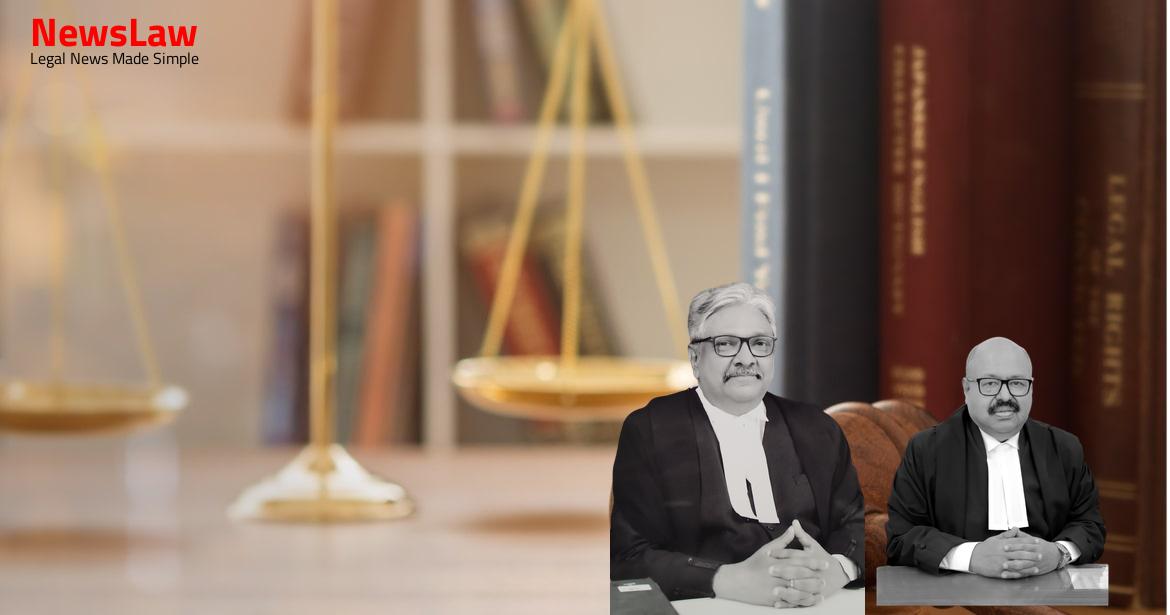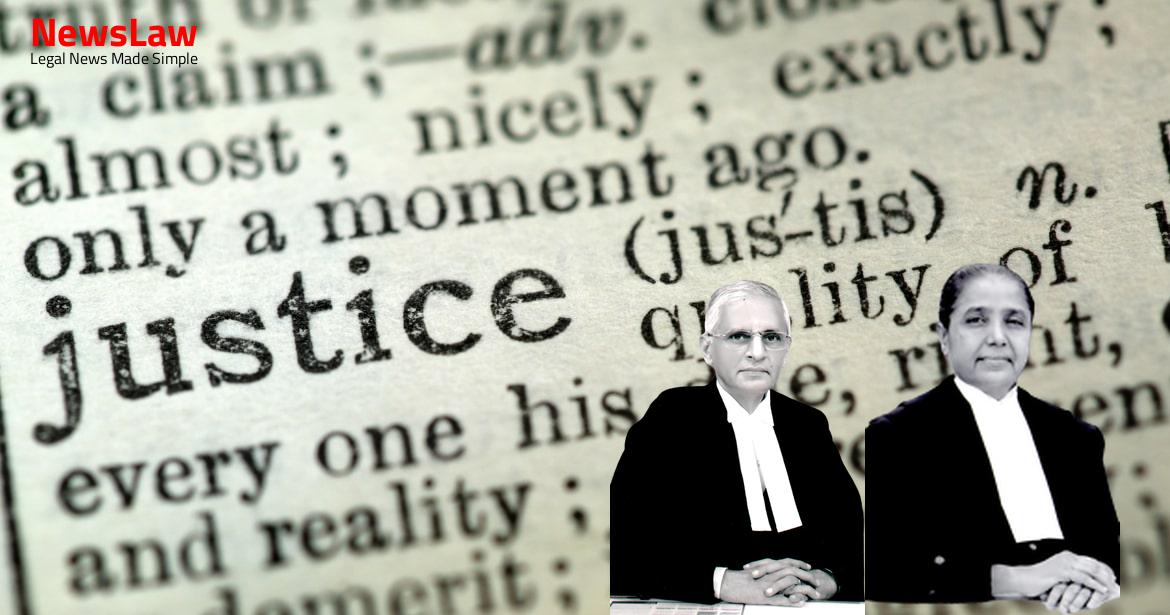The Delhi High Court recently ruled on a case involving the Rehabilitation Council of India (RCI) and petitioners challenging the circulars related to Special Education courses. The Court examined the legality of the RCI’s decisions and the application of the principle of promissory estoppel. Learn more about the judgment and its significant implications for the Special Education sector.
Facts
- The petitioners applied for commencing various Special Education courses based on invitations by the Rehabilitation Council of India (RCI).
- The RCI issued circulars on 4 January 2024 and 8 March 2024, returning the applications of the petitioners and increasing the number of seats in existing institutions.
- The petitioners challenged these decisions through writ petitions seeking a writ of certiorari to quash the circulars and a writ of mandamus to direct the RCI to consider their applications on merits.
- The RCI regulations require institutes to adhere to the standards recommended by the RCI for Special Education courses.
- The RCI has a history of issuing guidelines for establishing institutions providing Special Education courses and permitting intake enhancement in existing colleges offering such courses.
- The Court is obligated to assess the legality of the respondents’ decision to reject the petitioners’ applications.
- The Court must also review the approval of an increase in seat intake for special educators at current institutions.
- Determining whether the respondents’ actions were lawful is vital in this case.
Arguments
- The impugned decisions to return applications for starting new Special Education courses were based on a letter from the office of the Hon’ble Minister of Social Justice and Empowerment.
- Mr. Sharawat argues that the Ministry exceeded its authority by issuing directions in a field governed by legislation, specifically the RCI Act.
- The decisions were taken without independent application of mind by the RCI and were not supported by statutory provisions.
- The NEP 2020 recognized the need for additional special educators, which contradicts the decision to return applications for starting Special Education courses.
- The impugned decisions allowed existing institutions to increase student intake without clear justifications or adherence to established norms.
- Ms. Jauhari defends the decisions, citing the NEP 2020 and the composition of the EC of the RCI.
- Mr. Sharawat highlights flaws in the decision-making process, lack of compliance with natural justice, and hasty decision-making.
- The circular dated 8 March 2024 lacked justification for the decision to increase seats in existing institutions for Special Education courses.
- The lack of specific infrastructural requirements for increased student intake beyond 35 seats raises concerns about academic standards and compliance.
- The argument over whether the petitioner has standing to challenge the decisions is also addressed.
- References to legal precedents and statutory provisions are made to support opposing arguments on the validity of the impugned decisions.
- 571 institutions set up infrastructure for special education courses based on invitations by the respondents
- Actions of the respondents placed these institutions in jeopardy
- Central Government’s interference in executive discretion where legislation is in place
Analysis
- The judgment analyzes the applicability of the principle of promissory estoppel in the context of fresh proposals for Special Education courses.
- The RCI issued circulars inviting fresh proposals without limitations on the nature of the programs for the academic session 2024-2025.
- The decision to return the petitioners’ applications was solely based on a letter from the Hon’ble Minister, which was found insufficient as a legal justification.
- The judgment examines whether any supervening public equity existed to prompt the decision not to consider fresh proposals for D.Ed. Spl. Ed. and B.Ed. Spl. Ed. courses.
- The importance of ensuring the possibility of restoring the status quo ante before resiling from a representation held out by the government is highlighted.
- The petitioners’ investments in setting up institutions based on the representations made by the RCI are emphasized.
- The specific guidelines and decisions made by the RCI regarding the continuation of Diploma Level Courses in Special Education are scrutinized.
- The principles of equity and legitimate expectation are invoked to determine the legality of the decisions made by the RCI.
- The lack of overwhelming public interest as a justification for resiling from earlier representations is a significant factor considered in the judgment.
- The judgment underscores the need for the government to provide a rigorous standard of proof to justify resiling from promises or representations.
- An Institute of rehabilitation professional course cannot be started without the prior approval of the Council or the Central Government.
- Institutions must approach the Council through the respective State Government/Union Territory Administration to obtain approval for starting Degree/Diploma/certificate courses.
- The State Government/Union Territory Administration must clearly indicate their stance on whether a college or institution managed by a Non-Governmental Organisation should be started.
- In cases of urgent matters where Executive Committee’s decision cannot wait for the next meeting, the Chairperson may take action, but it needs to be ratified by the Executive Committee in the next meeting.
- The Executive Committee has various powers and functions including laying down broad policies, reviewing budget estimates, sanctioning expenditure, investing funds, and creating posts.
- All posts with a basic pay of Rs. 30,000 and above require prior approval of the Central Government for creation.
- The Executive Committee can make decisions on creation, appointment, and promotion of other posts.
- In urgent cases, decisions may be made by circulation to all members of the Executive Committee, and any modifications or reversions to decisions must be recorded without affecting the validity of previous actions.
- Principle of promissory estoppel applies against the Government.
- Government can be allowed to change its stand if there is a supervening public equity.
- Government can withdraw from representation if it is in the public interest, after satisfying the Court.
- Law on this aspect laid down in the case of Motilal Padampat Sugar Mills Co. Ltd. v. State of U.P.
- Urgent need for additional Special Educators is recognized.
- Public interest does not justify returning petitioners’ applications for new D.Ed. Spl. Ed. and B.Ed. Spl. Ed. courses.
- Impugned decision cannot be justified by NEP 2020.
- The legal position is clear and other issues need not be considered.
- No need to discuss decisions cited by Mr. Sharawat.
Decision
- The decision to grant approval for seat enhancement will be based on verification of requirements.
- The Council will conduct inspections before the enhancement of seats.
- The Circulars dated 4 January 2024 and 8 March 2024, which returned the petitioners’ proposals, are quashed and set aside partly.
- The proposals will be processed in line with the law.
- The challenge to the Circular dated 8 March 2024, permitting existing institutions to increase seats, is dismissed.
- The writ petitions are partly allowed with no orders as to costs.
Case Title: DELHI COLLEGE OF SPECIAL EDUCATION Vs. REHABILITATION COUNCIL OF INDIA (2024:DHC:4642)
Case Number: W.P.(C)-5398/2024



